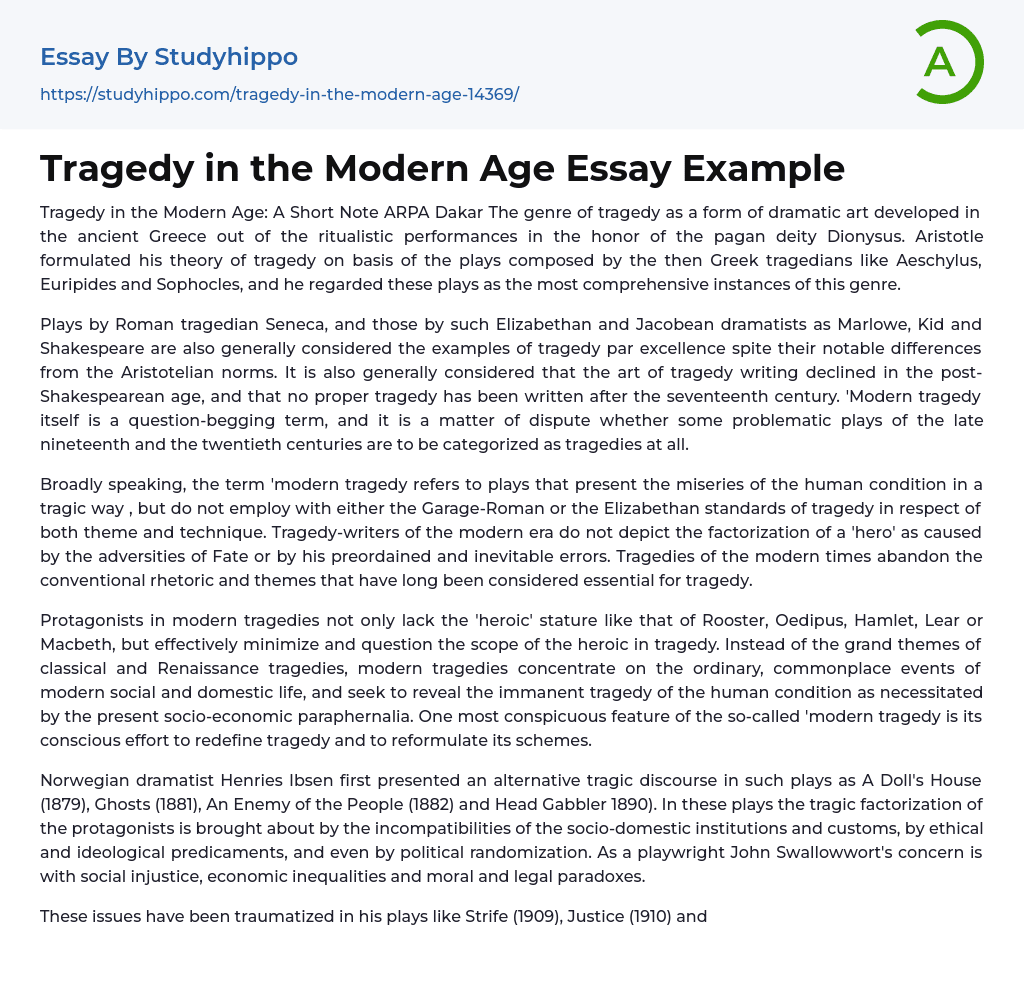Tragedy in the Modern Age: A Short Note ARPA Dakar The genre of tragedy originated in ancient Greece through ritualistic performances dedicated to the pagan deity Dionysus. Aristotle developed his theory of tragedy based on works by Greek tragedians like Aeschylus, Euripides, and Sophocles, considering them the epitome of this genre. Tragedies by Seneca in Rome and Elizabethan and Jacobean dramatists such as Marlowe, Kid, and Shakespeare are also considered exemplary tragedies despite their differences from Aristotle's principles. However, after Shakespeare, the art of writing tragedies declined, and it is debated whether certain problematic plays from the late 19th and 20th centuries can be categorized as tragedies at all. Generally, "modern tragedy" refers to plays that depict the sufferings of human existence in a tragic manner but deviate from both ancient Greek and Elizabethan standards in
...terms of themes and techniques.
Modern tragedy writers do not portray the downfall of a 'hero' as a result of Fate or their own inevitable mistakes. Instead, they deviate from traditional rhetoric and themes that have long been considered integral to tragedy. In modern tragedies, the protagonists do not possess the same heroic qualities as figures like Rooster, Oedipus, Hamlet, Lear, or Macbeth. They minimize and question the concept of heroism in tragedy. Instead of focusing on grand themes found in classical and Renaissance tragedies, modern tragedies concentrate on ordinary events in contemporary social and domestic life. They aim to reveal the inherent tragedy of the human condition as influenced by current socio-economic circumstances. An evident characteristic of these so-called 'modern tragedies' is their deliberate attempt to redefine and restructure the genre. Norwegian playwright Henrik Ibsen introduce
an alternative tragic discourse in plays such as A Doll's House (1879), Ghosts (1881), An Enemy of the People (1882), and Hedda Gabler (1890). In these plays, the protagonists' tragic downfall arises from conflicts within social and domestic institutions, ethical and ideological dilemmas, and even political turbulence. Playwright John Swallowwort is concerned with social injustice, economic inequalities, and moral and legal contradictions.
The plays Strife (1909), Justice (1910), and Loyalties (1922) by R.C. Sheriff address issues of trauma. In Lugging Pirandello's Six Characters in Search of an Author (1921), the play dramatizes the problematic nature of combining professional and artificial stagecraft in portraying tragedy. R.C. Sheriff's Journeys End (1929) and The White Carnation (1953) explore the tragic loss of life in political warfare. Eugene O'Neill's Mourning Becomes Electra (1931) reimagines the myth of Roasters to depict the Mammon family's conviction amidst the turbulent social context of post-Civil War America. Similarly, J.M. Synge's Riders to the Sea (1904) showcases the sorrowful living conditions and tragic deaths of the Ran islanders, paralleling classical tragedies through the portrayal of universal human agony and suffering. Arthur Miller, an American playwright, challenges Aristotelian definitions of tragedy and explores multiple facets of tragedy in plays like All My Sons (1947), Death of a Salesman (1949), and The Crucible (1952).
In his Introduction to his Collected Plays in 1957, Miller argues that there is no more reason to worship Aristotle's Poetics than Culicid's geometry, despite the passage of many centuries since Aristotle's time. He also asserts that the anxiety and suicidal death of Wily Loan in Death of a Salesman represents a genuine solid gold tragedy, although the tragic viewpoint encompasses a
multitude of formal variations that cannot be defined by a single definition. The Theatre of the Absurd, a significant trend in 20th century English drama, challenges traditional definitions of tragedy and comedy. Plays such as Waiting for God and Endgame by Samuel Becket, The Bald Prima Donna and The Lesson by Eugene UNESCO, The Birthday Party by Harold Pinxter, and Rosencrantz and Guildenstern Are Dead by Tom Stoppard cannot be neatly categorized as tragedy or comedy. Despite their seemingly lighthearted approach, these plays explore grave and often harrowing subjects, revealing the true essence of tragedy through the depiction of absurdity, alienation, and existential crisis in everyday life.
The definition and scope of tragedy have significantly evolved over time, influenced by societal and cultural changes. In the modern era, this evolution has been so significant that it challenges the traditional definition of tragedy. Twentieth-century playwrights respond to this ongoing transformation and attempt to define tragedy through the contemporary forms of dramaturgy.
As a result, modern tragedy is not a singular genre but rather a dynamic and experimental form that reflects the current state of tragedy. This analysis is based on the books The Theory of Drama by Already Nicolle (Methuen, 1974), A Dictionary of Literary Terms by J. A. Cuddle (Penguin, 1982), and Tragedy (The Critical Idiom) by Clifford Leech (Rutledge, 2002). ARPA Dakar holds an M.A. in English Literature from the University of Calcutta. Contact: [email protected]
- Educating Rita essays
- Book Summary essays
- Metaphor essays
- Reader essays
- Rhyme essays
- Literary devices essays
- Villain essays
- Books essays
- Genre essays
- Literary Criticism essays
- Writer essays
- Protagonist essays
- Simile essays
- Poem essays
- Book Report essays
- Book Review essays
- Greek Mythology essays
- Plot essays
- Tragic Hero essays
- Coming of Age essays
- Play essays
- Rhetoric essays
- Rhetorical Question essays
- Translation essays
- Understanding essays
- Reason essays
- Character essays
- Letter essays
- American Literature essays
- Literature Review essays
- Utopia essays
- Poetry Analysis essays
- Dante's Inferno essays
- Between The World and Me essays
- Incidents in The Life of a Slave Girl essays
- Flowers for Algernon essays
- Myth essays
- Everyday Use essays
- Boo Radley essays
- Genesis essays
- Richard iii essays
- Alice in Wonderland essays
- On the road essays
- Ozymandias essays
- The Nightingale essays
- Holden Caulfield essays
- Animal Farm essays
- 1984 essays
- A Hanging essays
- Shooting An Elephant essays




